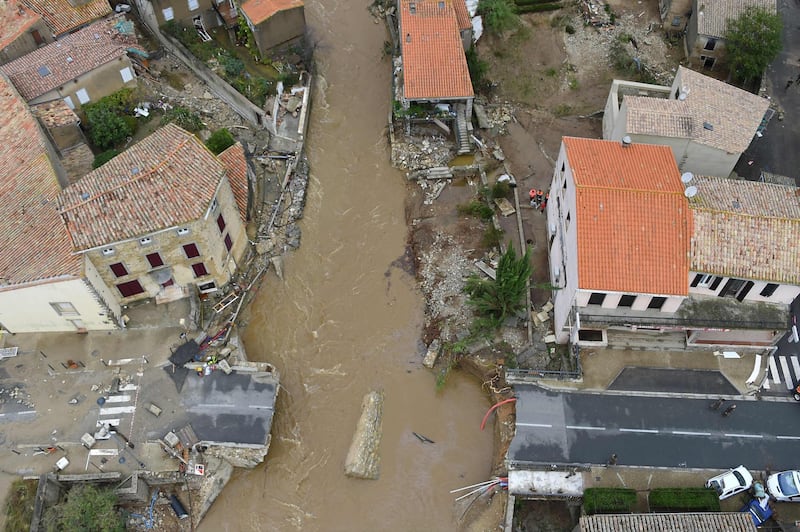Violent rainstorms turned rivers into raging torrents in southwest France on Monday, prompting some of the deadliest flooding in years, officials said, leading to at least 11 deaths.
The equivalent of three months rainfall was dumped overnight in the region of Carcassonne, sending rivers over their banks, including the Aude, which reached levels not seen in 100 years.
Local authorities in the Aude department said 11 people were killed, a second reduction in the official toll which had earlier stood at 13, a figure given by the interior ministry.
_______________
Read more:
World not doing enough to combat disastrous climate change
Rescue hopes turn dark in the wake of Hurricane Michael's devastation
27 dead in floods, landslides on Indonesia's Sumatra island
_______________
Two people were still missing with eight others seriously injured, authorities added.
President Emmanuel Macron, whose office said he will soon visit the affected areas, offered “the sympathy and solidarity of the entire nation for the victims of the Aude flooding and their families.”
The rescue operations is expected to delay an announcement on a government reshuffle, triggered by the sudden resignation of Interior Minister Gerard Collomb nearly two weeks ago.
Prime Minister Edouard Philippe, who is also the interim interior minister, said the government would ask insurers to process disaster claims and payments "as quickly as possible" while he assessed the damage in the region.
One of the victims was an 88-year-old nun who was swept from her room by floodwaters at the Burning Bush priory in the village of Villardonnel, north of the fortress city of Carcassonne.
“The water crashed through the building’s main door and on through the door to her room, the lowest in the convent,” said Sister Irene, the mother superior.
Elsewhere, flash floods overturned cars, gutted streets and battered buildings and bridges, especially to the north of Carcassonne where authorities ordered bridges closed.
Evacuations were still being carried out in several towns in the afternoon, local authorities said.
“There’s water everywhere in the house. Everything is flooded,” Helene Segura told AFP by telephone from the hard-hit village of Villegailhenc, where at least one small bridge had collapsed.
“Rescue teams were deployed as quickly as possible, but operations have proved to be complicated,” said interior ministry spokesman Frederic de Lanouvelle.
In the town of Trebes, near Carcassonne, the Aude rose eight metres in just five hours killing six people, officials said.
Trebes made headlines earlier this year after a jihadist attacker killed four people in a shooting spree, including a police officer who took the place of a hostage.
Two elderly residents died overnight in Villegailhenc, where the main bridge collapsed, and one person was killed in Villalier, making this one of the deadliest storms in France for a decade.
With many roads impassable, helicopters were used in the rescue operations.
Around 1,000 people were evacuated from the area of Pezens, also near Carcassonne, amid fears that a nearby dam could burst, and thousands of homes throughout the area were without electricity after strong winds brought down power lines.
The storms were triggered when a front of warm and humid air from the Mediterranean Sea slammed into colder air around the Massif Central mountain range, inundating an area from the eastern Pyrenees to Aveyron further north.
This well-known weather pattern occurs three to six times a year in the region and nearly always triggers flash flooding.
But the French weather forecasting service, Meteo France, suggested these episodes had recently become more frequent and more severe.
An unrelated storm on Sunday also hit Portugal, leaving 28 people with minor injuries and hundreds of thousands without power amid flooding in the region around the capital Lisbon.
The heavy rains, which later rolled on through Spain, were the tail end of Hurricane Leslie in the Atlantic, which weakened to a post-tropical storm as it made landfall.
Last week, another weather system moving across the Mediterranean left 12 people dead on the Spanish island of Majorca as well as two people in southeast France.
Further north, nearly 100 people have been evacuated because of flooding in Norway, where heavy rainfall has been accompanied by warm temperatures that have melted snow.






